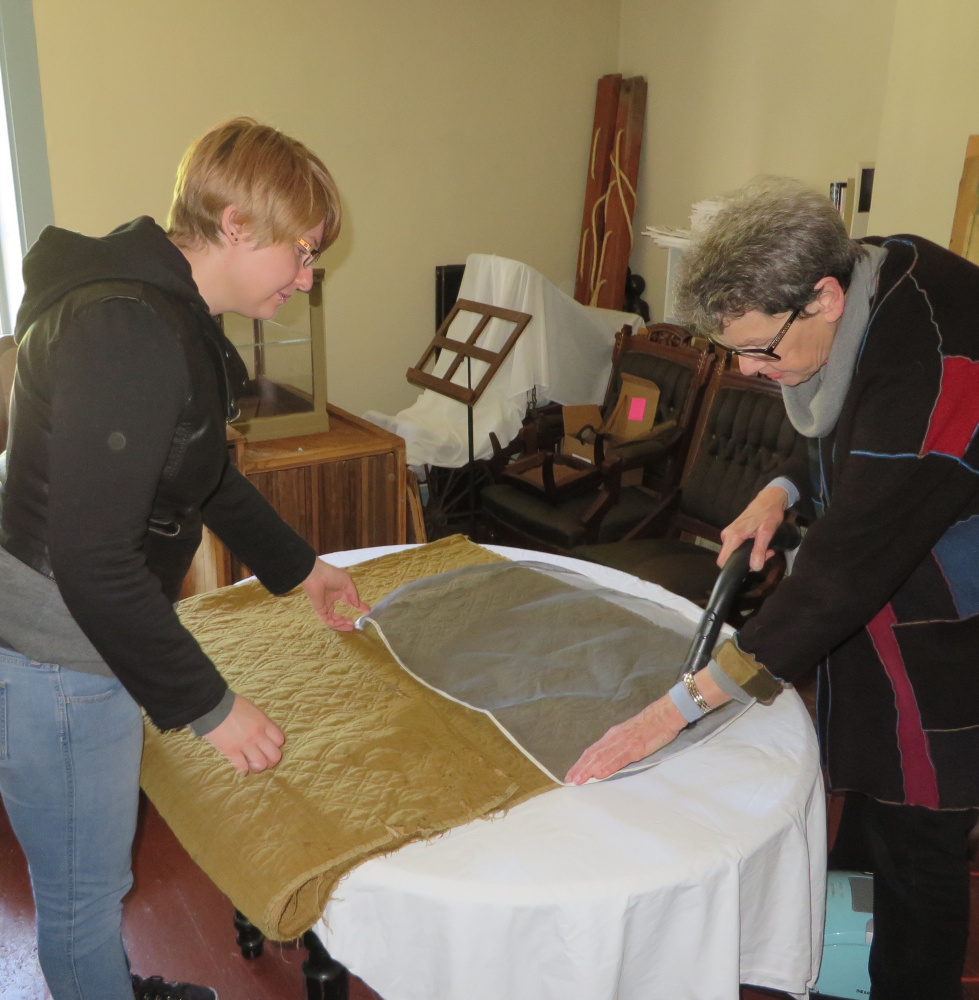Twenty-seven textile conservation specialists from the
Costume Society of America volunteers spent two days at the Old Jail in Wiscasset working with Lincoln County Historical Association volunteers to clean, repair and store items in the historical association collection.
The association’s part-time executive director Kerry Cushing start the application process for the Angels Project grant last fall, according to a LCHA news release. Cusing completed the application, coordinated a site inspection, and assisted in extensive preparation for the work days.
A week prior to the arrival of the Angels, members of the association’s collections committee and a hospitality committee helped to prepare work areas on three floors of the Jailor’s House and made arrangements to host the women in the homes of LCHA volunteers.
On the day of their arrival, the Angels visited Castle Tucker and viewed a collection of antique samplers at the home of Bill and Sally Gemmill. James Kochan hosted the group with a wine and cheese reception in his Main Street gallery before they walked to Sarah’s restaurant for dinner.
Martha Winslow Grimm, co-chairwoman of the Angels Project, explained that applicants for the grant must be small museums or historic sites with a limited budget and no more than one or two staff members. They must have a costume and/or textile collection and be located within about a 45-minute drive of the city in which the Costume Society’s annual convention is held. This year’s convention will be held in Portland.
“LCHA was chosen for this grant because of the enthusiasm shown by its committee,” Grimm said, according to the release. “They really care about the artifacts and want to learn the conservation process.”
This is the 12th year of the Angel’s Project. They have helped small museums all over the country to carry out a system for getting clothing and textiles ready to process into their collection.
First the item is photographed. Then it is vacuumed, using a vacuum cleaner with a HEPA filter and an adjustable suction that will not move the yarns.
“The best thing for cleaning fabric is to vacuum, not wash or dry clean,” Grimm said, according to the release. She also noted that among the approximately $2,500 worth of materials that come with the grant is one of these very special vacuums.
After vacuuming, each object’s accession number is written on label consisting of a narrow cloth tape, which is meticulously stitched to the object.
The next step is identification. A sheet is filled out that gives the date of the item, a description, and accession number. The Angels generally call upon their own expertise for this, but they had laptop computers handy for research.
The final step is packing. The Angels grant included a generous supply of archival boxes and acid-free tissue. Each box has a label holder with a 3-by-5-inch card containing the accession number and list of contents.
Eventually, photos also will be placed on the outside of the boxes, next to the labels.
The final step, to be undertaken this summer, will be to enter all the accession information into LCHA’s Past Perfect Database.
The day after the Angels departed, Faye Snyder, chairwoman of the LCHA Collections Committee, was exhausted, but ecstatic.
“They were extremely organized. They worked like a machine. They did more in one day than our committee could do in an entire summer,” said Synder, according to the release.
In addition to learning the latest conservation techniques, Synder said, “We learned how to treat and prevent infestations that had occurred due to the manner in which the fabrics had been stored,” according to the release. They also learned that certain items, such as the handles of some ladies’ fans, contain celluloid that breaks down and emits nitrous oxide, which will affect other items.
Synder reported that one of the Angels was amazed at what LCHA volunteers had accomplished without paid staff. She stated that she had never seen that much cooperation in a group. Pleased with the compliment, Faye said, “We will continue the process and go forward throughout the summer,” according to the release.
The Lincoln County Historical Association is a nonprofit organization that provides stewardship for the 1754 Chapman-Hall House in Damariscotta, the 1761 Pownalborough Court House in Dresden, and the 1811 Old Jail and Museum in Wiscasset.
For more information, visit www.lincolncountyhistory.org.
Send questions/comments to the editors.



Success. Please wait for the page to reload. If the page does not reload within 5 seconds, please refresh the page.
Enter your email and password to access comments.
Hi, to comment on stories you must . This profile is in addition to your subscription and website login.
Already have a commenting profile? .
Invalid username/password.
Please check your email to confirm and complete your registration.
Only subscribers are eligible to post comments. Please subscribe or login first for digital access. Here’s why.
Use the form below to reset your password. When you've submitted your account email, we will send an email with a reset code.